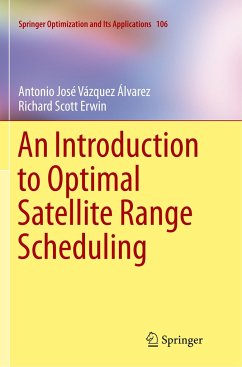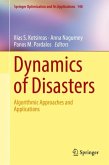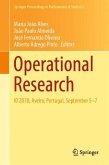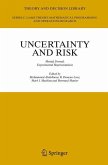The satellite range scheduling (SRS) problem, an important operations research problem in the aerospace industry consisting of allocating tasks among satellites and Earth-bound objects, is examined in this book. SRS principles and solutions are applicable to many areas, including:
Satellite communications, where tasks are communication intervals between sets of satellites and ground stationsEarth observation, where tasks are observations of spots on the Earth by satellitesSensor scheduling, where tasks are observations of satellites by sensors on the Earth.
This self-contained monograph begins with a structured compendium of the problem and moves on to explain the optimal approach to the solution, which includes aspects from graph theory, set theory, game theory and belief networks. This book is accessible to students, professionals and researchers in a variety of fields, including: operations research, optimization, scheduling theory, dynamic programming and game theory. Taking account of the distributed, stochastic and dynamic variants of the problem, this book presents the optimal solution to the fixed interval SRS problem and how to migrate results into more complex cases. Reference algorithms and traditional algorithms for solving the scheduling problems are provided and compared with examples and simulations in practical scenarios.
Satellite communications, where tasks are communication intervals between sets of satellites and ground stationsEarth observation, where tasks are observations of spots on the Earth by satellitesSensor scheduling, where tasks are observations of satellites by sensors on the Earth.
This self-contained monograph begins with a structured compendium of the problem and moves on to explain the optimal approach to the solution, which includes aspects from graph theory, set theory, game theory and belief networks. This book is accessible to students, professionals and researchers in a variety of fields, including: operations research, optimization, scheduling theory, dynamic programming and game theory. Taking account of the distributed, stochastic and dynamic variants of the problem, this book presents the optimal solution to the fixed interval SRS problem and how to migrate results into more complex cases. Reference algorithms and traditional algorithms for solving the scheduling problems are provided and compared with examples and simulations in practical scenarios.
"This is a clearly written, well organized, and very readable monograph, which should be useful for satellite operations engineers (its declared audience) as well as researchers and advanced students in computer science, scheduling theory, and optimization. Since this is an advanced-level text, readers would benefit from prior exposure to concepts and algorithms for scheduling. ... this monograph is a timely and valuable contribution to an increasingly important technological subdiscipline." (R. M. Malyankar, Computing Reviews, computingreviews.com, July, 2016)
"A precious contribution to the interface between operational research and modern high technology ... . The book is accessible to a vast circle of certainly interested ones, including students and professionals as well as scientists, from a variety of areas, including operational research, optimization, scheduling theory, dynamic Programming and game theory. ... This excellent book is well-structured, it revealsmathematical depth, it is well exemplified and written, and carefully illustrated." (Gerhard-Wilhelm Weber, zbMATH 1333.49002, 2016)
"A precious contribution to the interface between operational research and modern high technology ... . The book is accessible to a vast circle of certainly interested ones, including students and professionals as well as scientists, from a variety of areas, including operational research, optimization, scheduling theory, dynamic Programming and game theory. ... This excellent book is well-structured, it revealsmathematical depth, it is well exemplified and written, and carefully illustrated." (Gerhard-Wilhelm Weber, zbMATH 1333.49002, 2016)








